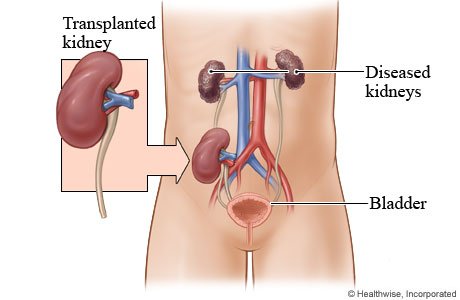Kidney Transplant

During kidney transplant surgery, a healthy kidney (donor kidney) replaces your own diseased kidneys, which may or may not be removed.
Why is a kidney transplant done?
Kidney transplant surgery is done so that a healthy kidney (donor kidney) can do what your diseased kidney can no longer do. Kidney transplant is used when you have severe chronic kidney disease (renal failure) that cannot be reversed by another treatment method. You will not be able to have this surgery if you have an active infection, another life-threatening disease such as cancer, or severe heart or lung disease.
How is a kidney transplant done?
The doctor will make a cut (incision) in your lower belly. The doctor will place the donated kidney in your lower belly. The doctor will connect the blood vessels of the new kidney to your blood vessels. Then the ureter of the new kidney will be connected to your bladder. (A ureter is the tube that carries urine from the kidney to the bladder.) Your own kidneys will not be taken out unless they are causing problems.
The doctor will finish the surgery by closing the cut with stitches or surgical staples. These will be removed about 1 to 3 weeks after surgery. The cut will leave a scar that will fade with time.
Kidney transplant: When to call
Watch closely for changes in your health, and be sure to contact your doctor if:
- You want more information about having a kidney transplant.
©2011-2026 Healthwise, Incorporated
